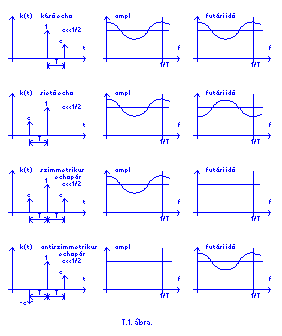Transversal filter (reflexion filter, echo corrector; hereinafter T-filter) is a digital
filter free from feedback. According to its build-up, it is flexible circuit, that can be
changed easily, thus it is very suitable for channel simulation and equalization tasks.
Operation of the T-filter is based on the principle of echo. If there are echoes occurring
in the output signal of a four-pole, it indicates, that the amplitude and phase
characteristics has sinusoid, or cosinusoid waves. For example, search the transmission
characteristic, which in the case of a one-impulse input can generate an echo, which is
late with T duration compared to the main signal.
 According to Figure T.1 , weigh function of the four-pole is the following:
According to Figure T.1 , weigh function of the four-pole is the following:
 From this we will get the transmission characteristic with Fourier-transformation as follows:
From this we will get the transmission characteristic with Fourier-transformation as follows:
 According to its definition, taking the amplitude-, phase-, and group delay
characteristics into consideration:
According to its definition, taking the amplitude-, phase-, and group delay
characteristics into consideration:
 So in the case of one late echo we will get approximately a cosinusoid amplitude- and group
delay characteristic with 1/T period. On the basis of similar computations we summarized
on the Figure T.1. the transmission characteristics realizing late, hurrying, or duplex
echoes. It can be seen, that we will get cosinusoid amplitude- and constant running time
characteristics in case of symmetrically occuring echo pairs for the main signal. In the
case of an antisymmetric echo pairs the running time characteristics is cosinusoid, and
the amplitude characteristic is constant with a very good approximation.
So in the case of one late echo we will get approximately a cosinusoid amplitude- and group
delay characteristic with 1/T period. On the basis of similar computations we summarized
on the Figure T.1. the transmission characteristics realizing late, hurrying, or duplex
echoes. It can be seen, that we will get cosinusoid amplitude- and constant running time
characteristics in case of symmetrically occuring echo pairs for the main signal. In the
case of an antisymmetric echo pairs the running time characteristics is cosinusoid, and
the amplitude characteristic is constant with a very good approximation.
Build-up of the device generating these characteristics is shown on the Figure T.2.:
 The signal given in gets to a delaying chain, which did not change the signal, just shifts
it in time. Thus compared to the medium branch we have late and hurrying signals, too.
Size and sign of the signals appearing along the 2N-membered link can be set with the help
of a 2N+1 piece of weighting circuit, suitably for the coefficients.
Finally we will get the output signal summarizing the weighted signals.
The signal given in gets to a delaying chain, which did not change the signal, just shifts
it in time. Thus compared to the medium branch we have late and hurrying signals, too.
Size and sign of the signals appearing along the 2N-membered link can be set with the help
of a 2N+1 piece of weighting circuit, suitably for the coefficients.
Finally we will get the output signal summarizing the weighted signals.





